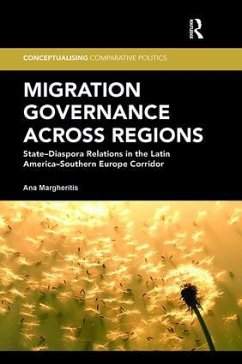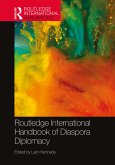Migration policies are rarely effective. Examples of unintended and undesirable outcomes abound. In Latin America, very little is known about the impact and long-term sustainability of state policies towards emigrants. Following a world-wide trend, Ecuador, Uruguay, Mexico, Argentina, and Brazil have developed new institutions and discourses to strengthen links; assist, protect and enfranchise migrants, and capture their resources. As an adaptation of governmental techniques to global realities, these policies redefine the contours of polities, nations, and citizenship, giving place to a new form of transnational governance.
Building upon field research done in these five states and two receiving countries in the last decade, Ana Margheritis explains the timing, motivations, characteristics, and implications of emigration policies implemented by each country, as well as the emergence of a distinctive regional consensus around a post-neoliberal approach to national development and citizenship construction. Margheritis argues that these outreach efforts resemble courting practices. Courting is a deliberate expression of the ambivalent, still incipient, and open-ended relationship between states and diasporas which is not exempt of conflict, detours, and setbacks. For various reasons, state-diaspora relations are not unfolding into stable and fruitful partnerships yet. Thus, she makes "diaspora engagement" problematic and investigates to what extent courting might become engagement in each case.
Studying emigration policies of five Latin American countries and migrant responses in Southern Europe sheds light on the political dynamics and governance mechanisms that transnational migration is generating across regions. It illuminates possible venues to manage multiple engagements of migrants with societies at both ends of their migration journey and unveils the opportunities for states and non-state actors to cooperatively manage of migration flows.
Building upon field research done in these five states and two receiving countries in the last decade, Ana Margheritis explains the timing, motivations, characteristics, and implications of emigration policies implemented by each country, as well as the emergence of a distinctive regional consensus around a post-neoliberal approach to national development and citizenship construction. Margheritis argues that these outreach efforts resemble courting practices. Courting is a deliberate expression of the ambivalent, still incipient, and open-ended relationship between states and diasporas which is not exempt of conflict, detours, and setbacks. For various reasons, state-diaspora relations are not unfolding into stable and fruitful partnerships yet. Thus, she makes "diaspora engagement" problematic and investigates to what extent courting might become engagement in each case.
Studying emigration policies of five Latin American countries and migrant responses in Southern Europe sheds light on the political dynamics and governance mechanisms that transnational migration is generating across regions. It illuminates possible venues to manage multiple engagements of migrants with societies at both ends of their migration journey and unveils the opportunities for states and non-state actors to cooperatively manage of migration flows.
'Margheritis makes an important contribution to the growing literature on diaspora policies by providing an original, detailed analysis of South American countries' recent efforts to establish or intensify linkages with their emigrant populations. Her work offers a much-needed comparative lens and situates the development of these policies in a regional context. The focus on these cases challenges existing assumptions about why, when and how states extend emigration policies towards their citizens living abroad.' - Alexandra Delano Alonso, Zolberg Institute on Migration and Mobility, The New School, USA
'Margheritis' bet for 'deep understanding of complex cases' pays off for the reader of this extraordinary study. Some of the hypotheses she suggests for further test and study are worth mentioning, as to invite more readers to get involved with this truly creative book.' - Luicy Pedroza, Migration Studies
'Margheritis' bet for 'deep understanding of complex cases' pays off for the reader of this extraordinary study. Some of the hypotheses she suggests for further test and study are worth mentioning, as to invite more readers to get involved with this truly creative book.' - Luicy Pedroza, Migration Studies








